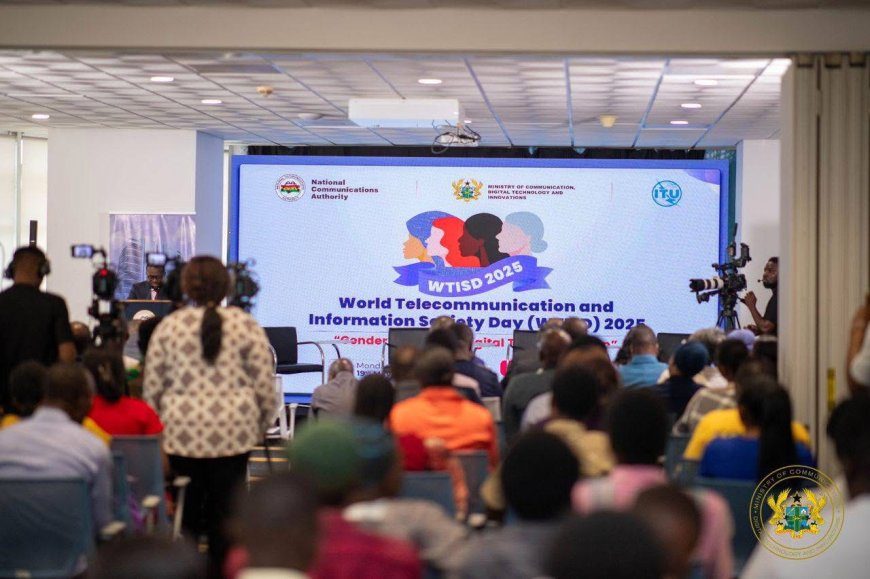Hon. Samuel Nartey George Calls for Urgent Action on Gender Equality in Digital Transformation

Hon. Samuel Nartey George Calls for Urgent Action on Gender Equality in Digital Transformation
Minister for Communication, Digital Technology and Innovations, Hon. Samuel Nartey George (MP), today made a passionate call for deliberate and strategic efforts to bridge the gender digital divide, as the country joined the rest of the world to mark World Telecommunication and Information Society Day (WTISD).
Addressing stakeholders, policymakers, development partners and technology professionals at this year’s WTISD celebration held in Accra, the Minister underscored the urgency of inclusive digital transformation under the global theme “Gender Equality in Digital Transformation”, which aligns with Sustainable Development Goal 5 on gender equality and women’s empowerment.
According to him, this was not just another celebration of progress. It was a moment to challenge the status quo and catalyse meaningful change, noting that digital transformation is not gender-neutral and must be tackled with intentionality.
“Just three weeks ago, I reiterated my Ministry’s unwavering commitment to the Girls-in-ICT Programme, a flagship initiative aimed at bridging the gender digital divide by equipping girls with skills in STEM, this initiative is not charity; it is strategy. A digital economy that excludes women is one that limits its own potential. I urge all stakeholders, public and private alike, to invest deliberately in the futures of our girls”, he mentioned.

Citing global statistics that highlight glaring disparities in digital access and participation, Hon. George pointed out that while 62% of men are online globally, only 57% of women have internet access. The gap widens significantly in Least Developed Countries, where just 30% of women are online, compared to 43% of men. In Sub-Saharan Africa, the gender gap in mobile internet use stands at 32%.
“These are not just statistics – they are manifestations of systemic inequality. Each data point represents missed potential and unjust barriers to access, opportunity, and safety”, the Minister stressed.
Hon. George also highlighted the ongoing One Million Coders Programme, currently being piloted in Accra, Kumasi, Sunyani and Bolgatanga, which has successfully achieved gender parity in participation.
*Three Pillars for Gender-Inclusive Digital Transformation*
Touching on policy-forward, the Minister proposed three critical areas of focus to drive gender equality in Ghana’s digital agenda:
1. Mentorship – Introducing girls to technology early, mentoring them consistently and investing in their success to build a strong pipeline of women in tech.
2. Infrastructure and Access– Expanding connectivity infrastructure in underserved areas to make access a right, not a privilege, while ensuring digital spaces are safe and inclusive.
3. Leadership and Policy– Promoting women’s participation in digital leadership and decision-making processes, ensuring that women shape policy and drive innovation.
Touching on Ghana’s broader digital agenda, Hon. George shared updates on major infrastructure projects including the National Information Highway, powered by 5G and fibre optics, which will connect communities, schools, and businesses nationwide.
He also announced that the Ministry is finalising a National Digital Policy to ensure the ethical and inclusive deployment of emerging technologies like Artificial Intelligence. The policy will integrate robust cybersecurity frameworks with an emphasis on protecting women in digital spaces.
“ICTs are not merely tools – they are gateways to opportunity. But those doors must open equally for everyone”, the Minister asserted.
A Call to Action
The Minister concluded his address with a powerful appeal to all stakeholders:
“If we are serious about building a digitally empowered nation, then we must be equally serious about gender equality in digital spaces. The cost of inaction is not borne by women alone – it is a loss for all of us. Every girl excluded from technology is a potential innovator, engineer, or leader the world will never know”, he reiterated.




 HENRY GERCHI
HENRY GERCHI 












